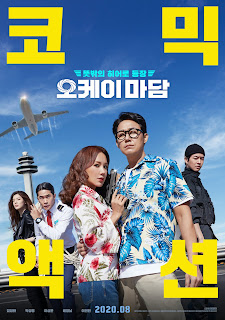Okay! Madam; or, National Lampoon’s Airborne Vacation
We have to go on this trip!
It has been a while, but I am getting back into Korean movies again. I am not sure if this is a long term thing or a passing mood, but I decided to check out some Korean comedies. My obvious first pick became Lee Chul Ha’s Okay! Madam from 2020. I admit that the movie would have totally missed my radar had it not been for a recommendation post made by my friend @penel over at MyDramaList.
We have to go on this trip!
It has been a while, but I am getting back into Korean movies again. I am not sure if this is a long term thing or a passing mood, but I decided to check out some Korean comedies. My obvious first pick became Lee Chul Ha’s Okay! Madam from 2020. I admit that the movie would have totally missed my radar had it not been for a recommendation post made by my friend @penel over at MyDramaList.
Release Info
Directed by: Lee Chul Ha Starring: Uhm Jung Hwa, Park Sung Woong, Jung Soo Bin
Language: Korean Original Title: 오케이 마담 Runtime: 100 min
Synopsis
Mi Young (Uhm Jung Hwa) and Suk Hwan (Park Sung Woong) are a middle-class family. She runs a shop at a traditional market, and he is a technology wizard who fixes computers. All of a sudden, it turns out that they win a trip to Hawaii. The couple together with their daughter (Jung Soo Bin) board an exclusive plane. Nevertheless, family happiness is quickly disrupted when a group of terrorists takes over the plane. The assailants are looking for a former spy from North Korea who is allegedly on board. Mi Young and Suk Hwan step into action to save their daughter and the rest of the hostages.
Mi Young (Uhm Jung Hwa) and Suk Hwan (Park Sung Woong) are a middle-class family. She runs a shop at a traditional market, and he is a technology wizard who fixes computers. All of a sudden, it turns out that they win a trip to Hawaii. The couple together with their daughter (Jung Soo Bin) board an exclusive plane. Nevertheless, family happiness is quickly disrupted when a group of terrorists takes over the plane. The assailants are looking for a former spy from North Korea who is allegedly on board. Mi Young and Suk Hwan step into action to save their daughter and the rest of the hostages.
High Anxiety
When I saw @penel’s feed post for the first time, I thought to myself, “Oh cool, it's a plane movie!” It was only later when I realised that Okay! Madam is also a comedy. Indeed, it is very hard to make a successful comedy set on board of an aircraft. However, there are a few noticeable examples, such as Airplane! (1980) and Happy Flight (2008).
When I saw @penel’s feed post for the first time, I thought to myself, “Oh cool, it's a plane movie!” It was only later when I realised that Okay! Madam is also a comedy. Indeed, it is very hard to make a successful comedy set on board of an aircraft. However, there are a few noticeable examples, such as Airplane! (1980) and Happy Flight (2008).
Okay! Madam is a very light-hearted and briskly paced fun entertainment. It even manages to conjure up a few plot twists along the way. Consequently, I am very grateful I checked out the film without paying attention to the plot synopsis or watching a spoiler-charged theatrical trailer. I suggest you do this as well in order to get full enjoyment out of the movie.
I realise that some demanding viewers may be put off by the film’s low production value. Evidently, it was made on a tight budget, which can be seen in many CGI shots of a plane in distress, whereas all the interior shots were shot in studio conditions. Still again, the greatest advantage of the movie is the script and great performances of the leads.
Speaking about performances, Uhm Jung Hwa is having such a field day in this movie! I mainly know the actress from her dramatic endeavours, but in Okay! Madam she clearly demonstrates her comic abilities. Park Sung Woong is also funny as the geeky husband. Lee Sang Yoon makes a standard appearance as your ordinary Mr Tough Guy, but he does well with his role. The rest of the supporting appearances are fine, but do not particularly stand out.
Recommendations
Even though the film is a Korean production, it makes me wonder if the title is actually a witty reference to Corey Yuen's action-packed Yes, Madam! (1985) which jettisoned Michelle Yeon into stardom. All in all, I greatly enjoyed Okay! Madam. The movie is available on numerous streaming platforms, including Amazon Prime.
Even though the film is a Korean production, it makes me wonder if the title is actually a witty reference to Corey Yuen's action-packed Yes, Madam! (1985) which jettisoned Michelle Yeon into stardom. All in all, I greatly enjoyed Okay! Madam. The movie is available on numerous streaming platforms, including Amazon Prime.
«Enjoyed this post? Never miss out on future posts by following us»






















